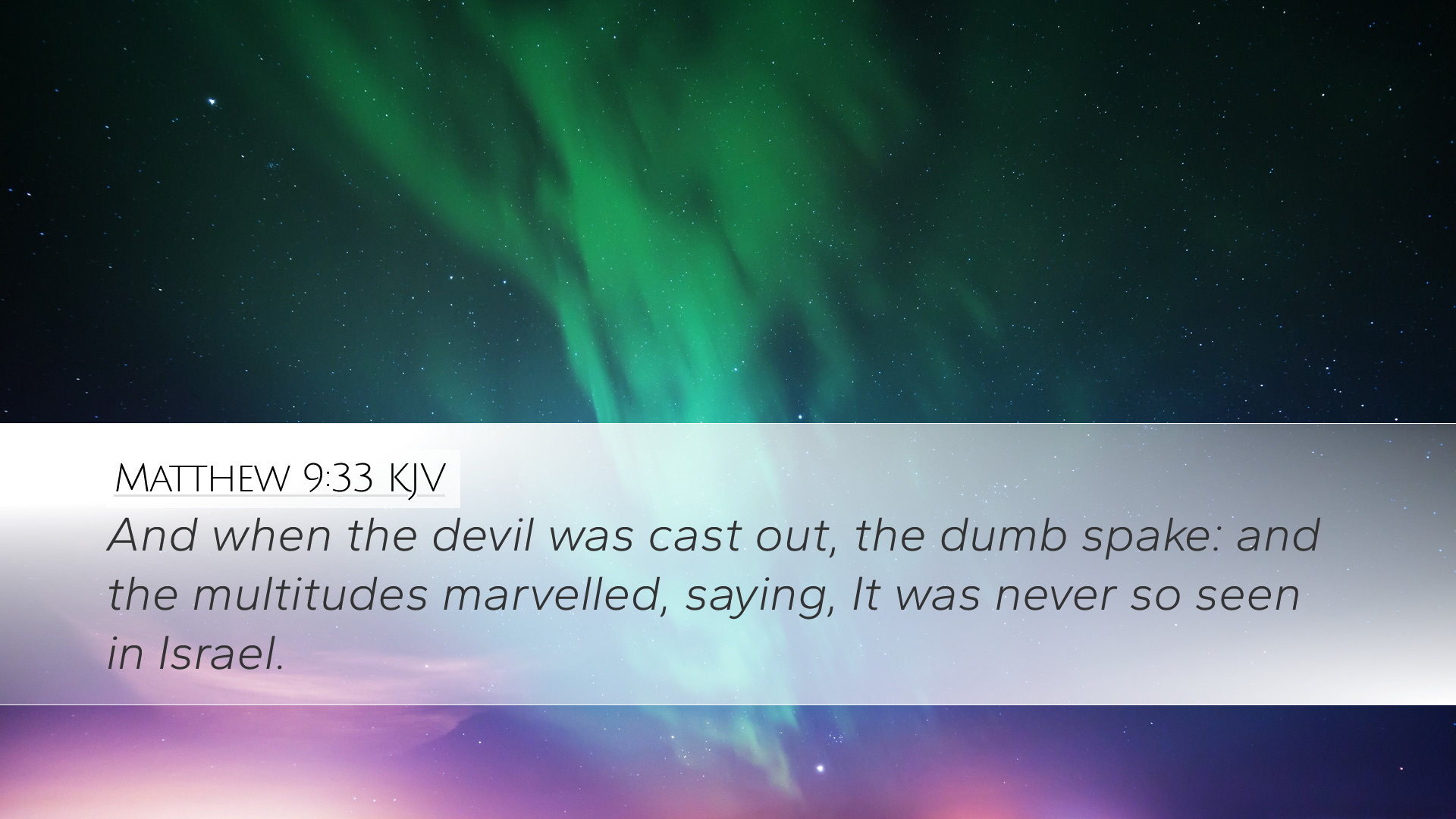Commentary on Matthew 9:33
Matthew 9:33 states, "And when the demon was cast out, the dumb spake: and the multitudes marvelled, saying, It was never so seen in Israel." This verse follows the account of Jesus healing a man possessed by a demon who rendered him mute. The implications of this miracle and the reactions of the people provide rich material for theological reflection and pastoral application.
Contextual Overview
The context of Matthew 9 includes a series of miraculous events led by Jesus, showcasing His authority over sickness, sin, and spiritual oppression. This particular miracle underscores Jesus' power over demonic forces, revealing not just His ability to heal physical ailments but also His authority to restore speech and communicate. The verse embodies a significant moment in Jesus' ministry, prompting reactions from the multitudes and drawing attention to the unique nature of His works.
Exegesis of Key Phrases
- “the demon was cast out”:
This phrase highlights the exorcism aspect of Jesus' ministry. The act of casting out demons signifies not only physical healing but also spiritual cleansing. Matthew Henry elucidates that demons are often linked with oppression, and Jesus' authority extends beyond mere human capacity, reflecting His divine nature.
- “the dumb spake”:
The restoration of the man's ability to speak after the demon’s expulsion symbolizes the transformative power of Christ. Albert Barnes emphasizes that this miracle not only restored the man's physical ability but served to signify the broader spiritual awakening that Jesus brings to those afflicted by sin and oppression.
- “the multitudes marvelled”:
The crowd's astonishment points to a growing awareness of Jesus’ unique identity. Adam Clarke notes that this marveling reflects both wonder and a challenge to the existing religious understanding, as the miracles performed by Jesus were distinct from anything seen previously in Israel.
- “It was never so seen in Israel”:
This declaration by the multitudes emphasizes the novelty of Jesus' works. Matthew Henry remarks that the phrase denotes a recognition of the unparalleled nature of Jesus' ministry compared to the religious leaders and the prophets of old. It challenges the status quo and invites a reevaluation of spiritual authority.
Theological Implications
The miracle encapsulated in this verse holds several theological implications that are pivotal for a deeper understanding of Christ's mission:
- The Authority of Jesus:
The act of casting out a demon with such immediate response illustrates Jesus’ supreme authority over the spiritual realm. This is a reaffirmation of His divinity.
- Restoration and Healing:
This healing extends beyond physical restoration to signify a holistic approach to salvation. The interplay of demonic possession and mute speech represents the broader context of human brokenness and the wholeness offered through Christ.
- Public Reception of Jesus’ Ministry:
The crowd’s reaction is essential for understanding the societal context of Jesus’ works. The amazement signifies an opening for faith, as the people are confronted with the reality of His miraculous acts, inviting them to reconsider their beliefs.
Practical Applications for Ministry
For pastors and theologians, this verse provides fertile ground for practical application:
- Preaching the Power of Jesus:
The narrative encourages the proclamation of Christ's authority, especially in the face of spiritual warfare, highlighting that Jesus is active in healing and restoration today.
- Engaging with the Mute of Society:
Just as Jesus restored the mute man, the church is called to engage with those in society who feel voiceless or oppressed, offering the hope and healing that Christ provides.
- Fostering Awe and Reverence:
The response of the multitudes reminds believers today of the importance of revering the miraculous works of God. Cultivating a sense of wonder in worship can deepen faith and lead to greater evangelism.
Conclusion
Matthew 9:33 serves as a powerful reminder of the transformative impact of Jesus' ministry. Through the lens of public domain commentaries, we see a multifaceted understanding of this verse that enriches the narratives surrounding Jesus' works. As pastors, students, and scholars contemplate these insights, they are invited to reflect on the lasting implications of Christ's authority and compassion in their own lives and ministries. The declaration that “It was never so seen in Israel” becomes a call for continual discovery of Jesus’ wonders and a challenge to live out the transformative grace He offers.


